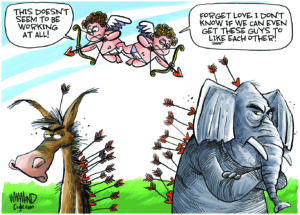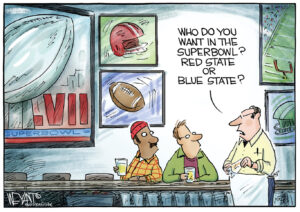Are Republicans Going the Way of the Whigs?
If I were a Republican activist, I think I would give up reading political journalism for a while. I might even turn to reading history, say the history of whatever happened to the Whig Party.If I were a Republican activist, I think I would give up reading political journalism for a while. I might even turn to reading history, say the history of whatever happened to the Whig Party. The Whigs, as most of us have almost certainly forgotten, begat the Republicans in 1856, and now the Republicans sometimes seem to be trying to beget (or repeat) Whig history. Once upon time there was a Whig Party. It elected four presidents in the 19th century and controlled both houses of Congress for a time. Then it was gone, even though its members included great men — Henry Clay, Daniel Webster and an Illinois congressman named Abraham Lincoln.
Though the Whigs opposed Thomas Jefferson’s vision of a United States peopled by yeoman farmers and they hated everything about Andrew Jackson, they were not reactionaries. They were conservatives dedicated to both decentralized state sovereignty and a strong, if small, national government capable of modernizing and industrializing this new Republic of ours. Their slogans emphasized unwavering, unalterable attachment to the Constitution and the Union.
More about that later. First, I can’t remember any burial of a national party — well, maybe the Democrats after 1968 — like the Republican funeral being commemorated since Mitt Romney’s defeat last year. The ceremony seemed to peak last Sunday when The New York Times Magazine cover was a photo of a 1960s dial telephone marked “GOP Smartphone.”
The question under that read: “Can young tech-savvy Republicans overthrow the party’s disconnected old guard?” The writer of the nine-page piece inside, Robert Draper, answered: “No!” Basically, Draper interviewed younger conservative consultants and tech guys and sat watching their focus groups. When participants were asked to free-associate and given the word “Democrat,” they said such things as “Young people!” … “Change” … “Open-minded” … “Spending” … “More science-based.”
What about the word “Republican”? They said: “Corporate greed” … “Old!” … “Rich” … “Hypocritical” … “Religious” … “Farmers” …”Rigid.”
Those Republican consultants, according to Draper, guessed it would be 20 years before that had any real power and impact on the Grand Old Party.
Back to the Whigs. The name came from England, and those who identified with it were anti-Royal. They did OK and became the Tory Party. The name rose up again early in the American Revolution. It was American “Whigs” who threw the Boston Tea Party. Then the name emerged again in the 1830s. Those Whigs, who opposed expansion of the Republic to Western territories, supported the supremacy of Congress over the presidency and favored a program of modernization and economic protectionism. They became the country’s majority party for a while. William Henry Harrison, Zachary Taylor, Millard Fillmore and John Tyler were Whig presidents, and they did many good deeds, mostly on the state level, promoting public schools and private charity, but they could never get it right on slavery, trying to remain neutral. So they divided on that great issue, with Southern Whigs moving into what is now the Democratic Party and Northern Whigs, like Lincoln, forming the Republican Party.
And that was that, until the politics of North and South flipped in our time. Remember Richard Nixon’s “Southern Strategy”? It worked for a while, but now the Republicans are splitting into conservative and more-conservative-than-thou wings, emphasizing social issues like abortion and gay marriage, which many younger Republicans see as death wishes.
The Whigs began losing it in 1852, when Franklin Pierce clobbered the Whig candidate, Gen. Winfield Scott. “We are slain,” said a Whig member of Congress. “The party is dead—dead—dead!”
So it was. Election laws today, which are essentially a contract between the Democratic and Republican parties to preserve each other, would make a new party — say with the Republicans splitting — more difficult to organize now. But if young Republicans are right, they have 20 years to overthrow the old orders.
© 2013 UNIVERSAL UCLICK
Your support matters…Independent journalism is under threat and overshadowed by heavily funded mainstream media.
You can help level the playing field. Become a member.
Your tax-deductible contribution keeps us digging beneath the headlines to give you thought-provoking, investigative reporting and analysis that unearths what's really happening- without compromise.
Give today to support our courageous, independent journalists.






You need to be a supporter to comment.
There are currently no responses to this article.
Be the first to respond.